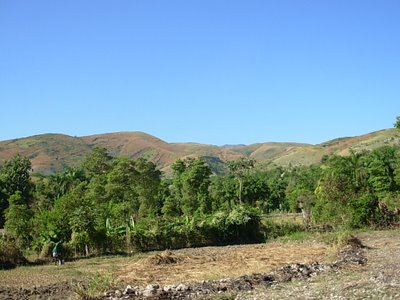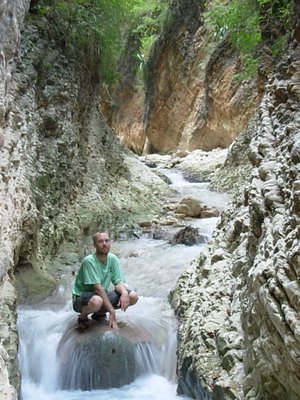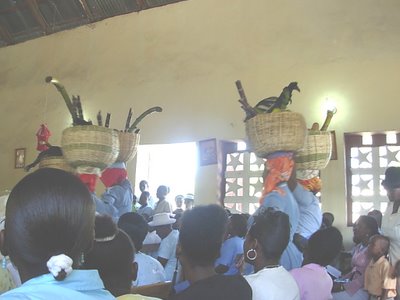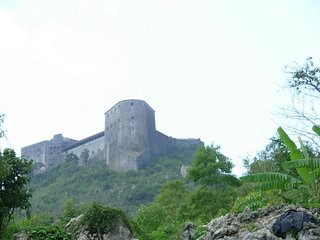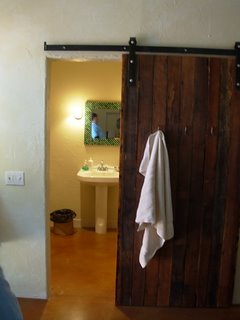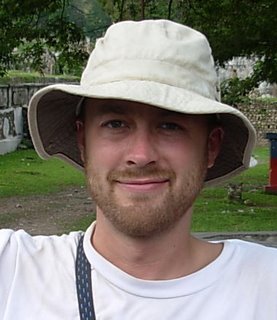There is a Haitian version of a Christmas tree which is often seen in roadside markets. They usually take a tree about 4 feet tall, strip all its leaves and paint it white. Another tradition is making little houses and churches, about the size of a classroom globe. The buildings are put together with paperboard, windows and doors are cut all over the sides with patterns of colored tissue glued to cover the holes. Then a candle is placed inside. Not the safest of decorations, but very pretty.
My contribution to Christmas this year was the same as it usually is back home: almond roca. I wasn't sure I'd be able to pull it off. I had to roast skinny Haitian almonds and use raw cane sugar, but otherwise I was able to find all the same stuff. Of course once it was made, I wasn't really sure what to do with it. I was afraid the chocolate would melt in the heat, so I put it in my little fridge. The inverter batteries didn't last very long, and my fridge lost power, and as the cold almond roca went to room temperature, water condensed on its surface. I could go on, but suffice it to say that by Christmas day when I was giving away the last bit of roca it was a melty, chocolatey blob.
I spent most of Christmas Eve just hanging out with Charity, who runs the MCC office, and her friend Trish. Trish, I discovered, went to Seattle Pacific and graduated just a year before me. The most surprising thing about that was the fact that we didn't recognize each other immediately as fellow alumni. Basically she came here right after college to teach elementary school. She fell in love and got married to an Arab Haitian. Confused?
Another random fact about Haiti is that there are thousands of Lebanese and Palestinian people - mostly Christian - living in the capital. Click here for an interesting article on this phenomenon. They came in several waves for several reasons, and though they all speak Creole and call themselves Haitian first and foremost, most live in an insular community in the hills above Port-au-Prince. But the insularity is only social, Arab Haitians are completely integrated into the business scene, owning most of the supermarkets and some of the sweatshops in Port-au-Prince.
On the evening of the Eve, I went with Charity and Trish to a get-together at the house of an American missionary. There was a short service before the food came out. We sang Silent Night by candlelight, which I'm used to doing every Christmas Eve in Medford. There were probably about 25 people there - mostly Americans, mostly missionaries.
I'm a little wary of missionairies in Haiti. Well, everywhere. Many missionaries are the absolute salt of the earth, people who are giving what they have to give driven by pure compassion. But too often it seems that American missionaries confuse the military and economic superiority of the US with some kind of moral superiority. They see Voodoo as devil worship. I'll write more about the very complicated subject of Voodoo later, but right now I'll just say this: it's not devil worship.
So anyway, at this Christmas party I got to talking with the host a little bit. He's a doctor who's been providing free medical care to peasants in the southeast for 20 years. A fascinating person, definitely one of the salt-of-the-earth types. He was a conservative in the sense that he was generally pessimistic about human nature. But instead of blaming Haitians for all of the country's problems, as conservatives often do, he was keenly aware of the destruction wrought by US economic and military policy. As he gave me example after example, he waived his arms around the room at his other guests and said, "These people all think I'm nuts!" And indeed I did get the sense that other people had heard it all before. I plan to spend more time with this doctor.
So all in all it was a lovely Christmas Eve, comforting and challenging. On Christmas day, I got together with Matt and Esther (reforestation workers), Charity (country representative), and Trish and Tariq (SPU girl and Haitian husband) for pumpkin pancakes at Charity's house. Later I went hiking with Matt and Esther. Here's Matt and I, looking out from a point so high that we were in a cloud:

And here's Matt and Esther's adopted daughter Gabriela, aka most perfect baby of all time:

The day after Christmas Matthew, Esther, Gabriela and I went up to a place called Seguin. To get there you drive southeast out of Port-au-Prince for an hour until you're way up in the mountains. Then you leave your vehicle behind and walk. The landscape is stunning up there. The climate is quite different. The people selling used clothing have laid out jackets and sweaters. Instead of seeing oranges and bananas for sale everywhere, it's carrots and leeks. It seems like every square inch of farmable land is being used for something. Impassible slopes are terraced into little rows, and the road is always going up, down, or sideways along the steepest of grades. All the while you're passing villagers, mainly women in groups, walking and gossiping about whatever while balancing enormous loads on top of their heads.
And then, after four hours of this, the road levels out and you arrive in a pine forest, one of the few areas in Haiti that is, at least officially, protected from deforestation. We stayed in a lodge surrounded by flowers and grass. I was so beat from the hike that I laid down for a nap. Even in the middle of the day it was cold from the mountain wind. I tried to find a spot with filtered light so I wouldn't freeze:

But the light wasn't filtered enough. I actually burned the backs of my hands, I think for the first time in my life. And my face is peeling heavily right now.
The lodge is run by a fascinating character named Winnie. His parents were both Haitian, one black and one Arab. He lives up there in his mountain paradise, spending his days philosophizing about the problems and potential of his beloved Haiti. He's got wind and solar power, and he's always experimenting with plants and even a fish pond. Here's Winnie with Gabriela:

We all felt like we could have spent a month up there. Each day I woke up with a little shiver, put on my boots and walked out to a hill where I could see all the way to the ocean off the southern coast. Perched on a rock in the middle of one of Winnie's future bamboo forests, huddled in my fleece, listening to The Flaming Lips on my iPod, it was hard to imagine a more perfect moment.
But eventually we did have to leave. When we finally made it back to the truck, we found it had been incorporated into the market.


